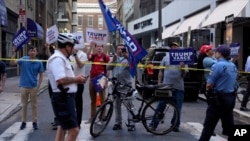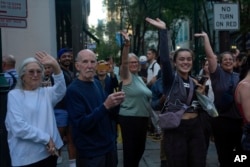It is the birthplace of U.S. independence, the "City of Brotherly Love," and the hometown of beloved fictional boxer "Rocky" Balboa.
Now Philadelphia, Pennsylvania, will be center stage again when Kamala Harris and Donald Trump meet in a highly anticipated televised debate that could weigh heavily on the November election.
The two, who have never met in person, will square off at 9 p.m. ET (0100 GMT) for a 90-minute debate hosted by ABC News.
Police are bracing for protests, with pro-Palestinian groups angry with Harris' continued support of Israel planning to demonstrate. Barricades have been erected around the National Constitution Center, the site of the debate, barring access to the historic area that includes the Liberty Bell and Independence Hall, where the U.S. Constitution was signed.
Meanwhile, several of the city's bars and universities are planning watch parties. Top Democrats will gather at a hotel for a watch party that Harris is expected to attend after the debate ends. Trump's plans after the debate are not yet public.
Some Philadelphia residents said they hoped to learn more about Harris.
"I wasn't, like, super impressed with her in 2020 when she had the presidential debates and for the primary," said Dan Bessler, a Philadelphia resident and sales worker. "But she is a prosecutor. ... I think she'll be able to hold her own better than Biden was able to at his age."
President Joe Biden's faltering debate performance against Trump in June essentially ended his political career, sparking powerful Democrats to convince him he should step aside ahead and allow Harris, his vice president, to run instead.
Since then, Harris has broken fundraising records and sparked new enthusiasm in the party, but opinion polls suggest a tight race looms with Trump.
With 19 electoral votes, Pennsylvania is the biggest prize of the basket of battleground states expected to decide the election. Most pundits predict whoever wins Pennsylvania will win the White House.
Democrats historically win Pennsylvania by running up huge margins in Philadelphia, to offset losses throughout much of the rest of the state.
In 2020, the city saw its highest turnout since 1984 — 68% — but it paled beside the statewide figure of 76.5%.






